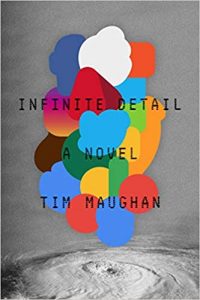Ian Mond Reviews Infinite Detail by Tim Maughan
 Infinite Detail, Tim Maughan (MCD x FSG Originals 978-0-374-17541-2, $16.00, 384pp, tp) March 2019.
Infinite Detail, Tim Maughan (MCD x FSG Originals 978-0-374-17541-2, $16.00, 384pp, tp) March 2019.
Tim Maughan first came to my attention with his 2011 collection Paintwork. The slim book featured three stories involving bleeding-edge technologies like augmented reality told from an outsider’s perspective: a street artist in Bristol, gamers in Cuba, an out-of-work documentary film-maker. In 2016 Maughan wrote the short-film In the Robot Skies (directed by Liam Young), the world’s first movie told entirely with drones. The unconventional love story meshed together technology, politics, and an urban setting as two teenagers, living in separate council estates monitored continuously by a network of drones, find gaps in the system to share scribbled notes. Infinite Detail, Maughan’s debut novel, is the culmination of these ideas, a politically astute, fascinating, and depressing glimpse of a near future brought to its knees by the abrupt death of the internet.
The narrative is split between either side of this cataclysmic event. The chapters labelled “Before,” set a handful of years from now, depict a modern world reliant on predictive algorithms where drones saturate the sky and most people access the internet through their Spex, a variety of smart glasses. Rushdi (Rush) Mannan, English born of Pakistani descent, is one of the few who refuses to sacrifice his privacy, his sense of independence and freedom, for the sake of convenience. In the heart of Bristol, he has established a digital black hole – the Republic of Stoke’s Croft – where the internet has been jammed, replaced by a decentralised network, and where people are free of surveillance, either by the Government or multi-national corporations. On a trip to New York to meet his online boyfriend in the flesh for the first time, Rush is again exposed to a world where everyone – from Wall Street traders to those living below the poverty line – is beholden to the Net. It’s during this trip to Manhattan, while taking part in a Black Lives Matter protest, that the network goes off-line and Rush considers the possibilities of a world without the web.
Alternating between Rush’s adventure in New York are the chapters marked as “After.” It’s a decade since the fall of the internet and Anika, one of the founding members of the Republic of Stoke’s Croft, has returned to Bristol in the hope of finding a remnant of Rush’s decentralised network. She believes it could be a game-changer, as part of the ongoing rebellion against the fascistic Land Army, the de-facto Government that formed when everything went to shit. What she finds instead is a teenager named Mary who appears to have the supernatural ability to glimpse the past, particularly the final, violent days of the Republic.
I want to believe that Infinite Detail is a cautionary tale, but much like the climate change fiction I’ve read recently (I’m thinking James Bradley’s Clade and Kim Stanley Robinson’s New York 2140), it depicts an inevitable future, one where we hand control over to algorithms we don’t entirely understand. This is brilliantly articulated by a trader Rush meets in New York who admits he has no “fucking clue” what the algorithms do. “I don’t think anybody does. I don’t even think the guys making the algorithms know.”
What stands out the most about Infinite Detail, isn’t Maughan’s fine understanding of technology, or his appreciation of a world without the internet, but how the novel is a critique on the nature of revolution. Midway through Infinite Detail, those responsible for shutting down the internet explain their reasoning:
We let ourselves become nothing more than the content between adverts. Our battle, our beliefs, our loves – nothing more than the filler before the next ad break.
And yet, despite their high-principled aims to reboot society, there’s no follow through. The “Government” that forms from the ashes of the internet, at least in the UK, is far worse than what preceded it. As Grids, the new leader of Stoke’s Croft explains: “Your revolution, with no idea of what would happen next, just created a massive hole full of people fucking each other over to stay alive.”
Maughan clearly has sympathy for characters like Rush, looking to establish a world where the Government can’t pry into our lives, where civil liberties and privacy and independent thought are put before algorithms and convenience. But he also doesn’t revel in anarchy. What’s so timely and powerful about this book is how pragmatic it is about the current moment, how Maughan appreciates that the internet, the cloud, those pesky algorithms are firmly embedded in our capitalist reality and that disentangling ourselves, without completely destroying civilisation as we know it, will be a difficult task.
This review and more like it in the February 2019 issue of Locus.
 While you are here, please take a moment to support Locus with a one-time or recurring donation. We rely on reader donations to keep the magazine and site going, and would like to keep the site paywall free, but WE NEED YOUR FINANCIAL SUPPORT to continue quality coverage of the science fiction and fantasy field.
While you are here, please take a moment to support Locus with a one-time or recurring donation. We rely on reader donations to keep the magazine and site going, and would like to keep the site paywall free, but WE NEED YOUR FINANCIAL SUPPORT to continue quality coverage of the science fiction and fantasy field.




